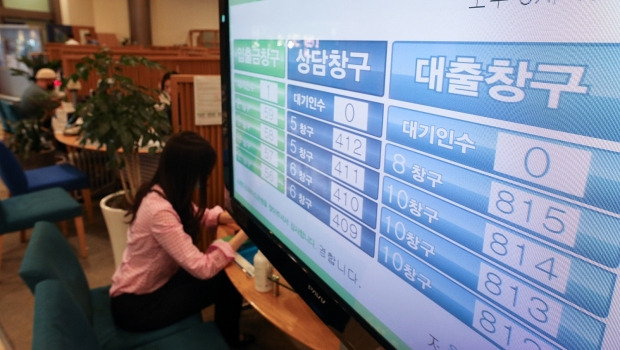‘Disaster subsidy shock’… 5-year Treasury Bond rate, 11 months high
5-Year Treasury Bond Interest Rate Linked Bogeumjari Loan’Excitement’
2030 financing burden seems to increase

Commercial bank loan window. /News 1
It is expected that the burden of’preparing a home’ for young people in their 20s and 30s will increase. This is the result of the 5-year treasury bond (government bond) interest rate, which is the standard for calculating the interest rate of the Bogeumjari loan, which they use, soaring to the 11-month high. Treasury rates are rising as the issuance of large-scale government bonds is announced to finance the fourth emergency disaster support fund. The’butterfly effect’ of the disaster subsidies is leading to the burden of the youth.
According to the Financial Investment Association on the 27th, the 5-year government bond yield on the 26th ended at 1.449% a year, up 0.075 percentage points from the previous day. It was the highest in 11 months after March 23 last year (1.42% per year). On the 26th, the rise in 5-year interest rates (0.075% points) was the highest since March 19 (0.178% points) last year when the global financial markets fluctuated due to concerns about the corona 19 pandemic (pendemic).
The 5-year government bond yield reached a record low of 1.037% per year on July 30 last year. However, as a result of continuing the upward trend, it exceeded the 1.4% range on the 26th.
As the 5-year interest rate soars, the Bogeumjari loan interest rate is also expected to rise. This is because the Bogeumjari loan rate is linked to the 5-year government bond rate. The interest rate for the product’u-bogeumjari loan’ (expired 10 to 30 years) was only 2.1~2.35% per year from September to November last year. However, when the 5-year government bond rate jumped, it rose to 2.25% per year in December of last year. This year, it rose again to 2.35% per year. The product of’Akim e Bogeumjari Loan’ (expired 10 to 30 years) also jumped from 2 to 2.25% per year in September to November last year, to 2.25 to 2.5% per year this year. As the 5-year interest rate continues to rise, the Bogeumjari loan rate is expected to rise further.
The Korea Housing Finance Corporation’s Bogeumjari Loan is a product that lends up to 300 million won to people who have an annual income of 70 million won or less (if unmarried, only the person or married couple is combined) and the housing price to buy is 600 million or less . It was a procurement channel through which young people who set out to find a home could finance their borrowings at relatively low interest rates.
The rise in US Treasury yields is pointed to as the background of the soaring 5-year Treasury bond yield and the growing burden on the Bogeumjari Loan. On the 25th (local time), it is estimated that the interest rate of Korean government bonds also jumped partly due to the impact of the US Treasury bond rate exceeding 1.5% per annum. However, experts are analyzing the fundamental background of the 4th disaster subsidy shock boosting the 5-year government bond interest rate.
This is the effect of the government and the ruling party in earnest on the supplementary budget (additional budget) to finance the 4th disaster support fund. Related authorities, such as the ruling party and the Ministry of Strategy and Finance, plan to hold a party administration meeting at the National Assembly this afternoon to outline the size, target, and timing of the supplementary administration. The ruling party plans to deal with the supplementary bill at the plenary session of the National Assembly on the 18th of next month.
There is a high possibility that a significant amount of the additional funds will be raised as deficit government bonds (bonds issued by the government to fill the gap in income). This is the background of the evaluation that the youth are hitting the side effects of the 4th disaster support fund pushed by the politics.
Reporter Kim Ik-hwan [email protected]
Ⓒ Hankyung.com prohibits unauthorized reproduction and redistribution
